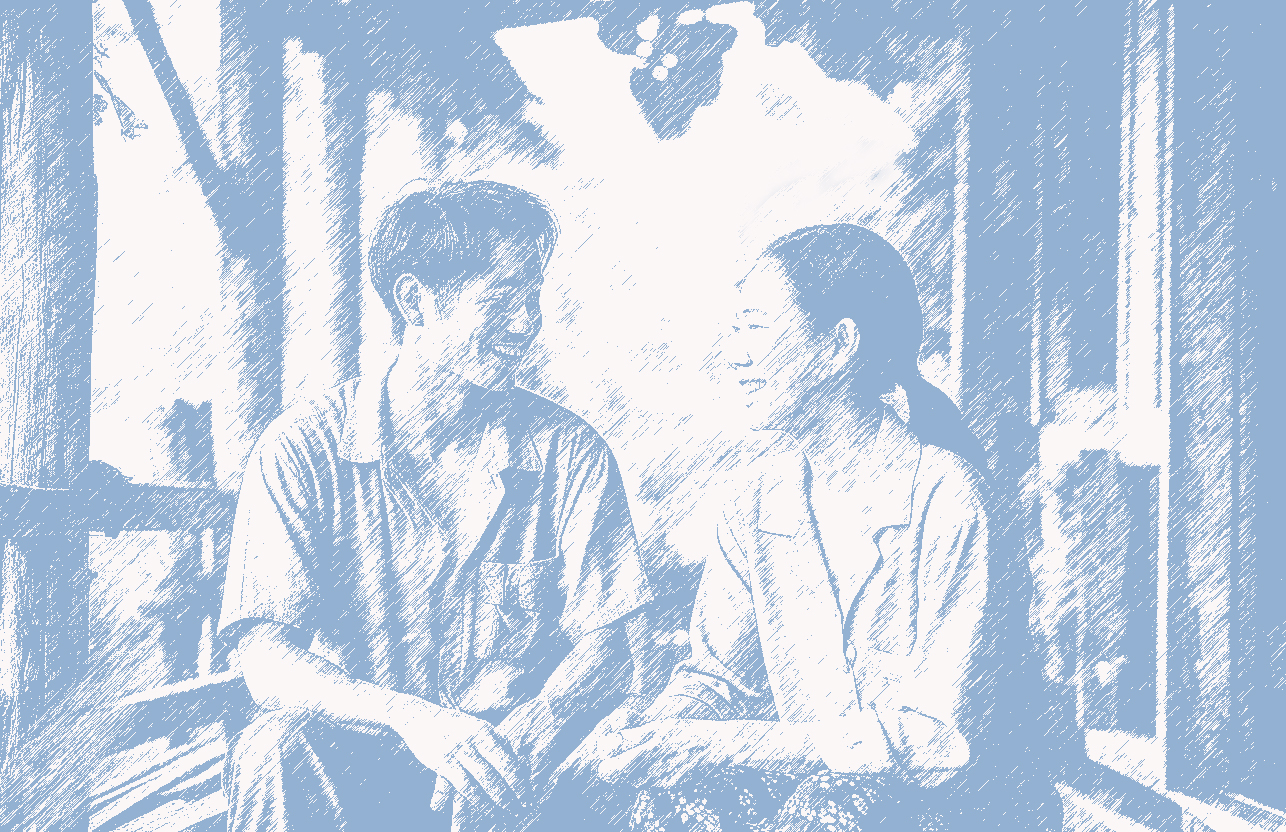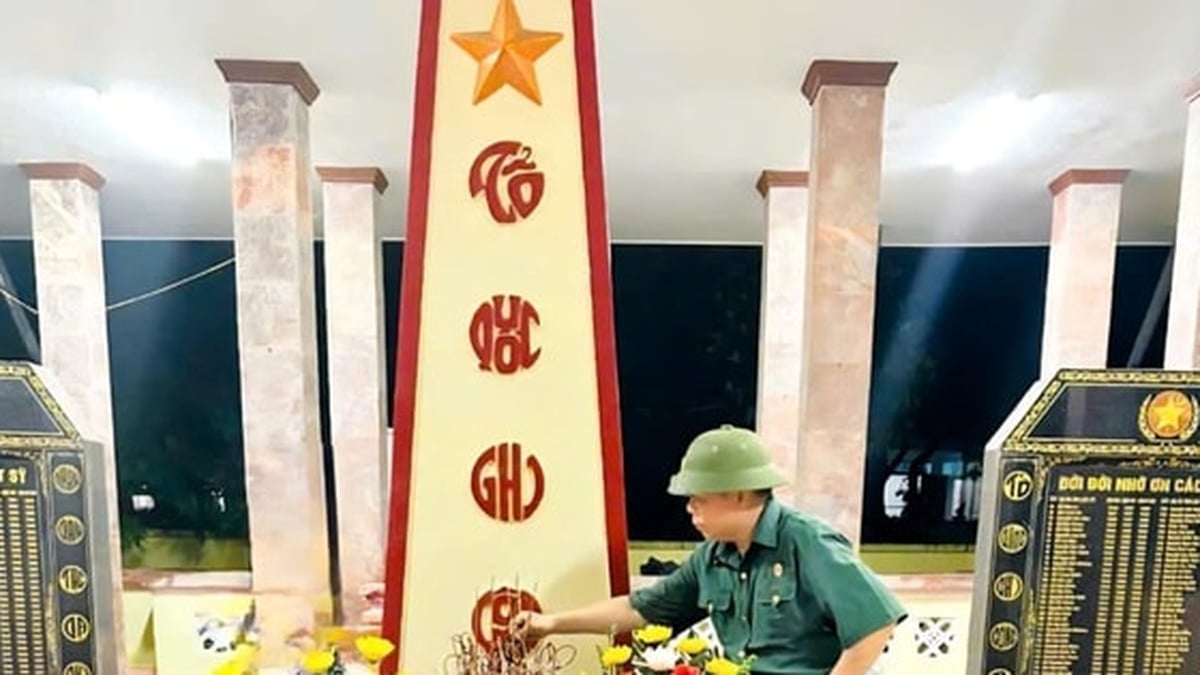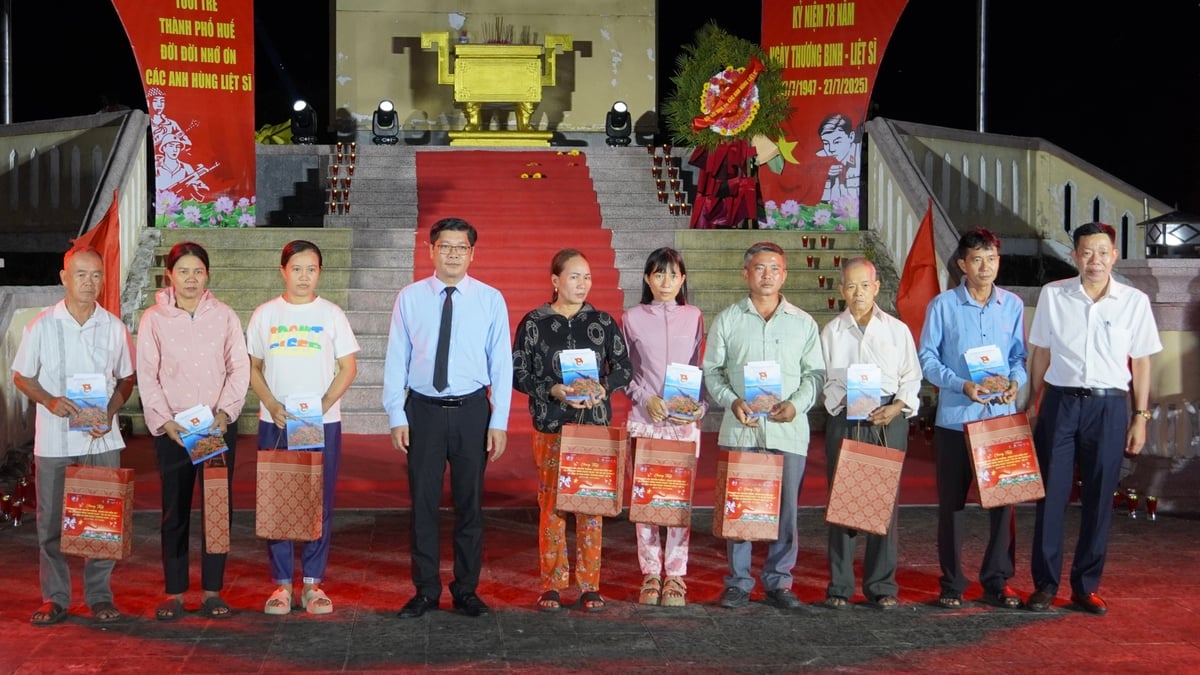Illustration: PV |
My mother passed away when I was still a baby. My father went to work as a construction worker in Saigon and only came home to visit once every few months. My entire childhood was the shadow of Lan's back around the fire, the sound of her calling out to study by the flickering oil lamp, the summer afternoons when she went to the fields to glean rice, picking up every fallen grain, and drying it on a stained tarp in the middle of the yard.
When I was ten, Lan was also eighteen - the age of dreams and hope. She had just finished her university entrance exam, carrying with her many dreams of going to university that she had cherished throughout her high school years. It was the end of August, the rice fields in front of the house were turning golden yellow, the dry sunlight spread over each curved ripe rice stalk, giving off a gentle fragrance. In the afternoons, after cooking and doing the laundry, she would sit under an old mango tree, combing her long black hair like ink, the sunlight falling on each strand of hair, shimmering like heavenly silk. I sat beside her, mumbling my multiplication tables, while she sang softly, her voice as clear as the wind in the fields.
Lan loved to study. Since childhood, no matter how poor her family was, she never missed a day of school. One time when it rained heavily and the water was up to her knees, she still walked nearly five kilometers to get to school. On winter nights, when the weather was bitterly cold and the wind howled through the bamboo walls, she lit an oil lamp and studied until late at night, her hands purple, but she still diligently took notes. Perhaps for her, writing was the only way out of the vicious cycle of poverty.
Then the day the exam results were announced. Her name was not on the notice. At that time, it had just started to rain. The rain in the West was not torrential but persistent, quiet like a sigh hidden in the heart. That afternoon, she sat absent-mindedly on the porch, the exam paper crumpled in her hand. I didn’t know what to say, so I just sat quietly beside her, giving her a hot boiled sweet potato.
She smiled, crookedly:
- It's okay. Take it again next year...
That evening, my father called. His voice was as cloudy as the first dew of the season:
- If you fail, then go to work. If you stay at home all the time, who can feed you?
The phone hung up, she didn't say anything. She just quietly folded the old notebook - the one she used to write her diary and essays, carefully put it in the wooden chest. I heard the sound of the chest lid closing, dry and decisive. That night, when I lay pretending to sleep, I heard her sigh very softly. That sigh didn't come from her throat but seemed to come from deep within her heart, long, endless, cold like the sound of wind whistling through a thatched roof with holes.
* * *
The following year, during the flood season, when the flocks of teals had just returned to cover the half-harvested rice fields, Lan packed her bags and headed to the city. She said:
- I work as a factory worker. Save money so that when I finish school, I won't have to drop out like you.
She left her hometown on a gloomy morning, the sky covered in a layer of gray clouds, as if holding back the footsteps of a girl who had never gone far. I stood on the porch, holding my torn school bag, feeling a pang in my heart. Since my mother passed away, I had never felt my house so empty.
In the early days in Saigon, her letters home were few and far between. She worked in an industrial garment factory, with a lot of work and constant overtime. Her salary was not high, but she still saved money to send me books. Once, she even sent a letter with a few lines blurred by tears:
- “I'm fine. Stay home and study hard. Don't let poverty hold you back.”
I grew up with each flood season, each time the passenger bus went back and forth on the dusty highway. At the beginning of each school year, she would send me a clean white shirt, or a uniform that fit my skinny body. Sometimes I wished she was home, just rice and vegetables would be enough. But then I thought, if it weren’t for her, I probably wouldn’t have been able to go to school.
Lan had a boyfriend one year when the city celebrated Tet early, when the yellow apricot blossoms began to bloom on people's porches. He was an electrical engineer, working near the boarding house where she lived. She said, her voice low and quiet like the evening smoke:
- Good photos, know how to share, I really love you.
It was the first time I saw her daydreaming like that. Her eyes lit up when she talked about him, and her smile became more frequent during hurried phone calls. I was secretly happy, hoping she would find someone worthy of the years she had sacrificed silently.
But things were not as smooth as the March wind. When she told me she wanted to bring him home to meet her parents, my father growled on the phone:
- Women in the countryside, working as workers, don't dream of climbing high. I don't accept it.
She argued, the first time I heard her voice so harshly. Then the phone fell silent. A few weeks later, she returned home alone, dressed simply, eyes red. She said he was on a business trip abroad. I didn't believe her, but I didn't dare ask more. In the silvery gray afternoon light that day, Lan sat hugging her knees by the bank of a dry ditch, her eyes far away as if looking to a place where no one was waiting.
* * *
Time flows like a river in the dry season, quietly eroding the sharp edges of memories. I passed the university entrance exam, the admission notice arrived on the day the first rain of the season fell. The drizzle tapped on the old corrugated iron roof, clanging like the sound of broken joy. Ms. Lan stood in the kitchen, her hands still covered in cake flour, hurriedly running out to greet me at the alley, holding the piece of paper with my name printed on it like holding onto a dream. Her tears fell on the blurred edges of the letters, not necessarily because of emotion but because the silent years she had left behind, now seemed to bloom in that moment.
I went to Saigon to study and rented a room near my sister's workplace. The small room was cramped but warm, because my sister was always by my side, a sister who was both a mother and a friend, and a light that never went out in the middle of the big city. She worked at a wedding dress shop, a job that required meticulousness and a keen eye. In the evenings after work, she would bend her back and cycle through the crowded streets, bringing me a bag of hot sticky rice, a bowl of mung bean sweet soup, or sometimes just a fragrant roasted sweet potato. She said:
- Try to study. Knowledge is something no one can take away. In the city, don't get carried away by other people. Finish your studies and then think about what to do next.
I studied. Four years of university passed in the blink of an eye. The stressful exam seasons, the sleepless nights with the thick textbooks, there was always her shadow somewhere, sometimes a hot lunch box waiting, sometimes a thin back leaning against the door watching me study without saying anything. The day I got my first job, my first month's salary, I stopped by a shoe store, chose a pair of pink flats - the style she often looked at but never bought. She held the shoes in her hand, hesitantly:
- You can still wear the sandals... Keep them and worry about the future.
Then she smiled, a smile as thin as the late summer sun, but strangely warm.
Lan got married when she was over thirty. That man was not an engineer, not romantic, and did not give her roses on holidays. He was just a carpenter, with a sloppy appearance and calloused hands, but his eyes were sincere and warm like old mahogany. I first met him at the market, when he was driving her on his old motorbike, carefully shielding her from the sun with an old shirt. Looking at her eyes at that moment, I knew: she had found a place to lean on.
Her wedding was as simple as she was: a few trays of food under the mango trees behind the house, a few songs in the windless noon. My father also came back. He didn't say much, just patted her shoulder tightly, like a belated apology after years of indifference. Her mother-in-law was a fried banana cake seller at the market, her voice was loud but her personality was sincere, she loved her like her own daughter.
Now she lives in the countryside, a small two-room house built next to a vegetable garden and a few banana trees. She has two children, a boy and a girl, both of whom are smart and bright. Every time I come home, the children rush out, chattering about school, friends, and what delicious dishes their mother cooks. She still smiles gently, one hand quickly picking vegetables, the other cupping the sweat off her child's forehead.
One rainy day, my sister and I sat on the porch, looking out at the muddy canal. The wind blew through the mangroves, rustling like the sound of time calling back. She asked:
- Are you tired up there? Do you miss the braised fish sauce rice I cooked? I smiled:
- Of course I miss you. I miss the rice, I miss you, I miss the sound of rain on the thatched roof. She didn't say anything more, just poured me a cup of hot ginger tea, her eyes shining with a gentleness that I will never forget in my life.
I sat there, in the middle of a small house by a quiet canal, looking at the woman who had spent her youth for me - now at peace, not noble but full, not noisy but happy. Outside, the sound of birds calling their flocks mixed with the laughter of children, blending with the wind, blending into my heart an indescribable feeling of gentleness. In the golden afternoon light, my sister - still like a field after a storm, quiet, simple but proud, and also the most peaceful shore in my life.
Source: https://baophuyen.vn/sang-tac/202506/chi-toi-f3e2c97/



































































![[Photo] National Assembly Chairman Tran Thanh Man receives Chairman of Morocco-Vietnam Friendship Association](https://vphoto.vietnam.vn/thumb/402x226/vietnam/resource/IMAGE/2025/7/26/b5fb486562044db9a5e95efb6dc6a263)



































Comment (0)